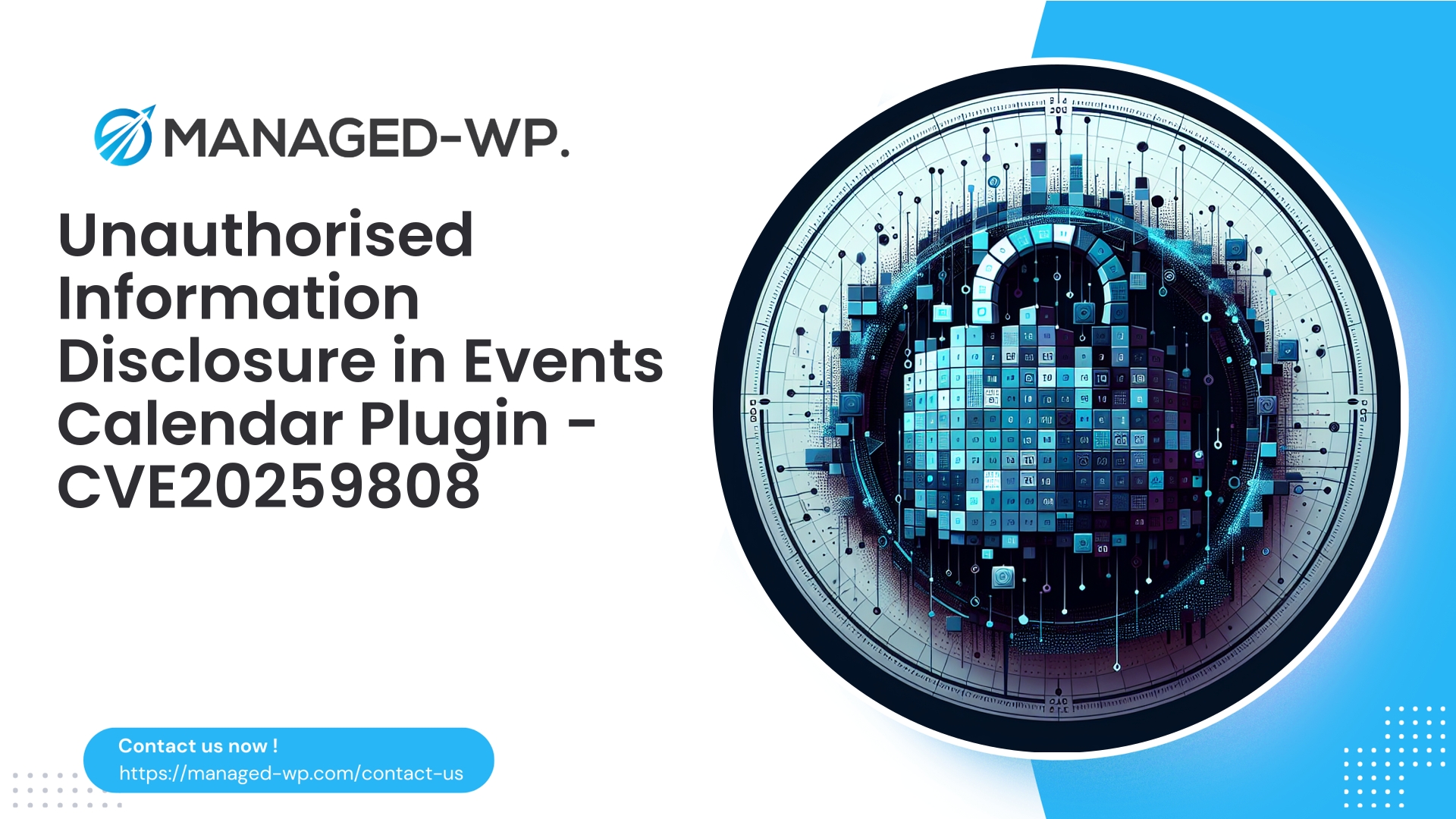| Plugin Name | The Events Calendar |
|---|---|
| Type of Vulnerability | Information Disclosure |
| CVE Number | CVE-2025-9808 |
| Urgency | Low |
| CVE Publish Date | 2025-09-15 |
| Source URL | CVE-2025-9808 |
Urgent Security Advisory: The Events Calendar (≤ 6.15.2) — Authorization Bypass Allows Password‑Protected Information Disclosure (CVE-2025-9808)
On September 15, 2025, a critical security advisory was issued for The Events Calendar, a widely deployed WordPress plugin used for managing event content. The identified vulnerability, tracked as CVE-2025-9808, affects all versions up to and including 6.15.2. The flaw stems from missing authorization checks, enabling unauthenticated users to access event data protected behind WordPress post passwords.
As a leading US-based WordPress security service, Managed-WP is committed to providing clear, expert analysis. This post outlines how this vulnerability impacts your sites, how to verify exposure quickly, immediate mitigation strategies, and best practices to safeguard against similar risks in the future.
Important: An official patch is available in version 6.15.3. Updating immediately remains the most reliable remediation. If immediate updating is not feasible, this article guides you through responsible temporary mitigations.
Executive Summary (TL;DR)
- Vulnerability: Broken Access Control enabling unauthorized access to password-protected event content.
- Impact: Attackers without any authentication may extract event content guarded by WordPress post passwords.
- Affected Versions: The Events Calendar ≤ 6.15.2.
- Fixed In: Version 6.15.3 — immediate update recommended.
- CVSS Score: 5.3 (Medium/Low depending on context); privilege required: none (unauthenticated).
- Immediate Recommendations: Update plugin ASAP; if unavailable, apply temporary virtual patches via WAF or block endpoints; monitor access logs; rotate any exposed credentials.
Understanding the Severity — Why You Should Act, But No Panic
Password-protected posts are a native WordPress feature allowing site owners to restrict visibility to select users via a simple post password. Event organizers frequently use this for sharing sensitive event details with private audiences or for protecting draft information.
The vulnerability exists because certain plugin API endpoints bypass the essential password authorization check. As a result, an unauthenticated attacker can query these endpoints and retrieve event titles, content, and metadata that should remain protected.
While this isn’t an immediate threat to your entire site (e.g., no remote code execution or admin takeover vectors directly), the silent nature of data exposure makes it serious. Malicious actors or automated scanners can enumerate affected sites en masse without detection, leading to leakage of potentially sensitive event information or attendee data if stored.
High-Level Technical Overview
- The plugin provides public-facing API endpoints (REST routes or AJAX actions) which accept event identifiers.
- WordPress core enforces password protection on posts by requiring password input before content is served.
- This plugin version fails to enforce those password checks server-side on some API endpoints, resulting in unprotected delivery of sensitive content.
- Hence, unauthenticated requests can fetch data reserved for authorized users only — a classic broken access control defect.
Managed-WP adheres to responsible disclosure; therefore, exploit code or exact attack methods will not be published here. Instead, we focus on defenses and detection.
Are You Vulnerable? Quick Verification Steps
- Plugin Version:
- Access your WordPress Admin Dashboard → Plugins section; check the installed version of The Events Calendar.
- If your version is 6.15.2 or lower, your site is vulnerable. The patch is included in 6.15.3.
- Access Logs Review:
- Inspect your web server or WAF logs for requests to event-related endpoints such as:
/wp-json/tribe/or/wp-json/tribe/events/REST routes- AJAX calls to admin-ajax.php with query parameters like
action=tribe_*
- Look for repeated or suspicious requests targeting password-protected event IDs.
- Inspect your web server or WAF logs for requests to event-related endpoints such as:
- Check for Password-Protected Events:
- If you use WordPress’s post password feature on your events (visible under “Visibility” in the editor), those particular posts are at risk.
- Safe Testing:
- Clone your production environment to staging.
- Perform authenticated and unauthenticated requests to the plugin’s REST or AJAX endpoints to verify if protected content is improperly exposed.
Immediate Mitigation Strategies
If your site is running a vulnerable version of The Events Calendar plugin, prioritize these security measures:
- Update Immediately to 6.15.3
- This is the only definitive fix to remove the vulnerability.
- Always test updates on a staging environment before production to prevent compatibility issues.
- If Update Is Not Immediately Possible, Apply Temporary Controls:
- Deregister or disable REST API routes related to “tribe” to prevent access:
- Use a mu-plugin or theme functions.php to remove vulnerable REST endpoints.
- Configure firewall or webserver level blocks:
- Block or limit access to URL patterns such as
/wp-json/tribe/*and AJAX actions referencing tribe/events. - Rate-limit these endpoints to reduce reconnaissance attacks.
- Block or limit access to URL patterns such as
- Require authentication tokens or WordPress cookies for these API requests if possible.
- Temporarily switch “Password Protected” events to “Private” status to restrict access to logged-in users with sufficient privileges.
- Deregister or disable REST API routes related to “tribe” to prevent access:
- Increase Monitoring and Logging:
- Enable detailed access logging on REST and admin-ajax endpoints.
- Set alerts for unusual spikes or unauthorized access patterns.
- Investigate Possible Exposure:
- Use malware and content scanners to detect any data compromise.
- If personally identifiable information (PII) or attendee details are stored, follow your organization’s incident response protocol.
Sample Defensive Code Snippets
Here are some quick code examples to help you reduce exposure as you prepare for a full plugin update. Apply these initially on a staging environment to test impact.
1) Disable The Events Calendar REST Endpoints
<?php
/**
* MU plugin: Disable The Events Calendar REST endpoints temporarily
*/
add_filter( 'rest_endpoints', function( $endpoints ) {
foreach ( $endpoints as $route => $handlers ) {
if ( strpos( $route, '/tribe/' ) !== false ) {
unset( $endpoints[ $route ] );
}
}
return $endpoints;
});
2) Enforce Authentication on Select REST Routes
<?php
/**
* MU plugin: Require logged-in user for tribe REST endpoints
*/
add_action( 'rest_api_init', function() {
$routes_to_protect = [
'/tribe/events/v1/events',
'/tribe/events/v1/events/(?P<id>\d+)',
// Add additional routes as needed
];
foreach ( $routes_to_protect as $route ) {
register_rest_route( 'tribe/events/v1', $route, [
'methods' => 'GET',
'permission_callback' => function() {
return is_user_logged_in();
},
'callback' => function() {
return new WP_Error( 'rest_forbidden', 'Authentication required to access this endpoint', [ 'status' => 403 ] );
},
]);
}
}, 1 );
3) Block Unauthorized REST Requests via Server Configuration
Apache (.htaccess) Example:
# Deny unauthenticated access to tribe REST API endpoints
<IfModule mod_rewrite.c>
RewriteEngine On
RewriteCond %{REQUEST_URI} ^/wp-json/tribe/ [NC]
RewriteCond %{HTTP:Cookie} !wordpress_logged_in_ [NC]
RewriteRule .* - [F]
</IfModule>
NGINX Config Example:
location ~* ^/wp-json/tribe/ {
if ($http_cookie !~* "wordpress_logged_in_") {
return 403;
}
}
These measures block anonymous requests at the server level before content reaches WordPress.
Virtual Patching via WAF
For sites with a Web Application Firewall (WAF), creating virtual patch rules can close the window of exposure while planning updates. Key strategies include:
- Block or rate-limit unauthenticated requests to REST endpoints matching
/wp-json/tribe/or AJAXaction=*tribe*parameters. - Prevent requests that retrieve full post content for password-protected IDs unless validated with WordPress cookies or nonce headers.
- Monitor and block scanning behavior such as repeated ID enumeration attempts on sensitive endpoints.
Example ModSecurity rule (illustrative only, test carefully before deployment):
SecRule REQUEST_URI "@beginsWith /wp-json/tribe/" "id:100001,phase:1,log,deny,status:403,msg:'Block unauthenticated Events Calendar REST access',chain"
SecRule REQUEST_HEADERS:Cookie "!@contains wordpress_logged_in_" "t:none"
Reminder: Misconfigured WAF rules may block legitimate integrations. Always test in staging.
Indicators of Possible Compromise
- Unauthenticated GET or POST requests to
/wp-json/tribe/or to AJAXadmin-ajax.phpwithactioncontaining “tribe” or “events”. - Requests referencing IDs that correspond to password-protected events.
- Traffic spikes from unusual IPs scanning event routes.
- Users reporting receipt of private event information unexpectedly.
- Private event content appearing on unauthorized third-party sites.
If these signs are detected, treat the exposure as confirmed. Follow your incident response policy, including notifying affected individuals if sensitive personal data was leaked.
Incident Response Recommendations
- Update The Events Calendar plugin to 6.15.3 immediately.
- Block vulnerable API endpoints using the protective measures provided.
- Review server logs covering the exposure period to identify unauthorized access.
- Identify compromised password-protected posts and treat event data as potentially exposed.
- If PII or attendee contact details were stored, notify stakeholders and comply with breach notification laws.
- Rotate sensitive credentials, such as API keys or tokens tied to event integrations.
- Conduct full malware scans and verify file integrity.
- Restore any affected systems from verified clean backups if needed.
- Strengthen monitoring controls for future suspicious REST/AJAX activity alerts.
Long-Term Security Recommendations
- Maintain accurate inventories of all plugins and themes with version tracking.
- Enable automatic security updates where safe and feasible.
- Implement layered security:
- Use strong passwords and 2FA for high-privilege accounts.
- Deploy managed WAFs capable of rapid virtual patching.
- Keep server software and PHP versions up-to-date.
- Limit exposure of unauthenticated public APIs; require authentication where practical.
- Use staging environments to test plugin updates thoroughly prior to production deployment.
- Monitor REST and AJAX API traffic for anomalies and unexpected usage.
- Educate content editors on proper data classification — recognize that post passwords do not equal strong access control.
- Prefer role-based access or private content plugins over password protection for sensitive material.
- Audit plugin maintenance and security track record; prioritize actively maintained projects.
- Adopt a vulnerability management program — track advisories and schedule timely updates.
The Importance of a WAF and Virtual Patch Layer
Plugin vulnerabilities like CVE-2025-9808 emerge regularly. There is always a window between disclosure and patch deployment across the ecosystem. A managed firewall with virtual patch capability shortens exposure by blocking exploit vectors at the network or application layer during this critical period.
Virtual patches are non-destructive, reversible, and allow organizations to maintain uptime and compatibility. Combined with robust logging, they enable timely detection and response without waiting for plugin updates.
Frequently Asked Questions
Q: If I update immediately, do I need to do anything more?
A: Updating to 6.15.3 eliminates this vulnerability. Post-update, monitor logs for suspicious pre-patch activity and conduct a thorough site scan to confirm no secondary issues.
Q: Are password-protected posts secure after this?
A: Password protection is a basic feature not designed for robust access control. For critical privacy, use private posts or membership/access management plugins that enforce proper authentication.
Q: Will disabling REST endpoints break my site?
A: It depends on your usage. Some integrations or front-end features might rely on these endpoints. Use targeted blocking or rate limiting for anonymous users as a less disruptive alternative.
Q: Can I fully protect my site without a WAF?
A: While updates and server-level blocks help, a WAF provides faster, more flexible protection to mitigate zero-day risks effectively while you prepare patch rollout.
Technical Detection Rules for Logging and Security Analytics
To identify suspicious activity across your logs or SIEM, implement alerts on patterns such as:
- Frequent requests to
/wp-json/tribe/endpoints originating from the same IP range. - AJAX requests to
admin-ajax.phpwithactionparameters containing “tribe” or “events” without WordPress authentication cookies. - Successful REST responses including cleartext
post_contentfor known password-protected post IDs.
Example Kibana or Elasticsearch query:
(request.uri: "/wp-json/tribe/*" OR request.uri: "/wp-admin/admin-ajax.php") AND NOT request.headers.cookie:/wordpress_logged_in_/
Establishing these alerts enhances your ability to detect automated scans and targeted data exfiltration.
How Managed-WP Helps Secure Your WordPress Site
At Managed-WP, we proactively monitor plugin disclosures and rapidly translate official patches into firewall rules and virtual patch signatures you can deploy immediately. Our comprehensive service offering includes:
- Instant detection and classification of new WordPress plugin vulnerabilities.
- Development and testing of non-intrusive virtual patches to block vulnerable behaviors.
- Automated alerts and remediation for clients enrolled in managed security plans.
- Advanced logging integration to simplify forensic investigations.
Whether you prefer self-service tools or a fully managed security approach, Managed-WP supports your efforts to minimize exposure windows and maintain secure WordPress operations.
Prioritizing Plugin Updates — A Practical Guide
- Critical/High Severity Vulnerabilities: Patch immediately and apply virtual patches as needed.
- Medium Severity: Assess your exposure and plan updates within 1-3 days; apply virtual patches if necessary.
- Low Severity: Schedule updates during routine maintenance but monitor for exploit attempts closely.
This particular vulnerability rates as medium/low in general but poses increased risk for sites utilizing password protection on events or storing personal data.
Start Protecting Your WordPress Site Today with Managed-WP
For immediate peace of mind during your evaluation and update process, consider Managed-WP’s free security plan. It provides essential firewall protection, unlimited bandwidth, malware scanning, and OWASP Top 10 mitigation tailored for WordPress sites.
- Sign up for the free plan here: https://my.wp-firewall.com/buy/wp-firewall-free-plan/
Our Standard and Pro plans extend protection with automated malware removal, IP reputation management, monthly security reporting, and proactive auto virtual patching to reduce your operational risk.
Step-by-Step Final Recommendations
- Verify your The Events Calendar plugin version immediately.
- If running ≤ 6.15.2, upgrade to 6.15.3 without delay.
- Until update, block vulnerable endpoints via WAF or server configurations and consider disabling REST routes temporarily.
- Increase logging, monitoring, and alerting on event API traffic.
- Audit all password-protected events for sensitive content exposure.
- If compromise is suspected, follow incident response protocols described above.
- Adopt long-term security hygiene and vulnerability management practices.
Closing Remarks
Information disclosure vulnerabilities—despite their seemingly lower severity—pose a significant risk. Unauthorized exposure of confidential event details or attendee information can cause reputational damage, regulatory compliance issues, and facilitate targeted follow-on attacks.
Mitigating such threats requires a comprehensive approach: timely patching, staged testing, proper use of WordPress access controls, and advanced firewall defenses capable of virtual patching. Managed-WP is here to support you with expert guidance, tools, and managed services to keep your WordPress environment secure and resilient.
If you need assistance verifying your site’s exposure, deploying temporary mitigations, or implementing a managed protection policy that lowers operational risk during plugin update cycles, contact Managed-WP today.



















